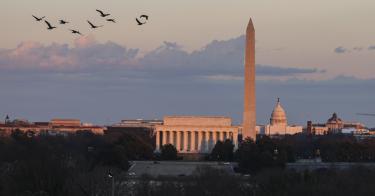When Philadelphia served as our nation’s capital, Pennsylvania refused to protect members of the Continental Congress against angry mobs. No wonder the framers of our Constitution wanted the new seat of our federal government to be free from the influence of any one state. They wanted to make sure that the federal government would ultimately be responsible for the safety and security of the capital city.
The District of Columbia remains the seat of the federal government, not a state. Consequently, it does not have voting representation in Congress.
Until recently, members of both political parties agreed that providing such representation—or changing the status of the District of Columbia—would require a constitutional amendment.
It was not until the Obama administration’s then-attorney general, Eric Holder, went against the advice of his own Office of Legal Counsel that the Department of Justice took a contrary view.
>>> Democratic Sen. Joe Manchin Gets It: D.C. Statehood Requires Constitutional Amendment
But what was true at our nation’s founding remains true today: The District of Columbia cannot be transformed into a state or significantly reduced in size without a constitutional amendment.
Some might argue that the Constitution’s district clause does not prohibit shrinking the size of the seat of the federal government to a very small area (essentially the national mall) to make way for most of the District of Columbia to become a new state. But that ignores the impact of the 23rd Amendment.
That amendment, ratified in March 1961, provides for the District of Columbia to participate in the presidential election process.
As Attorney General Robert F. Kennedy told Congress in 1963 when it was considering retroceding—or giving back—most of D.C. to Maryland by simply passing a statute, it is “inconceivable that Congress would have set in motion the cumbersome and arduous process of constitutional amendment, on a factual assumption which it anticipated might be utterly destroyed 3 years later.”
This makes sense and supports his position that “a persuasive argument can be made that the adoption of the 23d amendment has given constitutional status to the existence of a federally owned ‘District constituting the seat of government of the United States,’ having a substantial areas and population … so that a constitutional amendment repealing the 23d amendment would be required to abolish that district.”
Yet today, many on the left ignore this admonition and seek to do just that—abolish the current District of Columbia, our nation’s seat of government, without a constitutional amendment.
More troublingly, they paint those who oppose this move—even on constitutional grounds—as racists, which is ironic and sad because historically this has been the bipartisan consensus. Even several of the District’s own leaders, such as its first home rule mayor and its non-voting delegate in Congress, have in the past opposed D.C. statehood.
>>> D.C. Statehood Requires a Constitutional Amendment, and I’ll Put That on My Yard Sign
Today, as the D.C. City Council passes increasingly bizarre and dangerous legislation, such as allowing noncitizens to vote and decreasing the penalties for most crimes even as crime surges, D.C. statehood advocates are pushing back at Congress’ efforts to override these radical proposals.
Even President Biden released a statement saying congressional attempts to reverse the council’s decisions are “an affront to the democratic values on which our Nation was founded” and that “Congress should respect the District of Columbia’s autonomy to govern its own local affairs.”
Not really, though. Congressional oversight over the seat of our federal government—the District of Columbia—is exactly what our framers envisioned.
They didn’t want our nation’s capital—and the representatives, senators, government officials, and Americans from across the country who visit—to be held hostage to the whims of a few radical local legislators. Yet without congressional action, that’s exactly what we have today.
If our nation wants to change the status of the District of Columbia, we can. But it requires a constitutional amendment.
This piece originally appeared in The Washington Times




